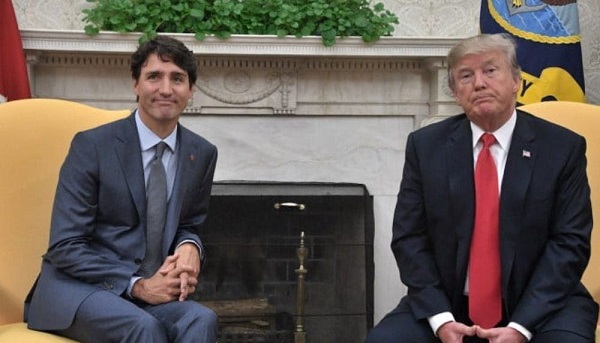Business
Trump Sanctions Flag A Harsh Reality—PRC and Canadian Elite Ties Underwrite Fentanyl Vulnerability

By Garry Clement
Former Senior Mountie Argues Geopolitics of Ottawa’s Relations with Beijing Loom Behind Trump Threats
The threat of a 25% tariff on goods from Mexico and Canada, announced by President-elect Donald Trump, highlights a harsh reality: Canada’s vulnerability to fentanyl is deeply intertwined with its close ties to China.
Chris George, a government relations advisor and writer, has highlighted the Liberal Party’s connections with Chinese leadership. He notes that the party’s relationship with the Chinese Communist Party is significantly influenced by Power Corporation, the Desmarais clan’s flagship enterprise.
“The Liberal Party of Canada is inseparably tied to the Chinese Communist Party today,” George alleges, “and much of the Canadian-Chinese business relationship is driven by Power Corporation, the crown jewel of the Desmarais family fortune.”
The ties between the Liberal Party and Power Corp have allegedly become so entrenched they are virtually indistinguishable:
- André Desmarais, son-in-law of former Prime Minister Jean Chrétien, serving as President and co-CEO of Power Corp.
- Former Prime Ministers Paul Martin, Jean Chrétien, and Pierre Trudeau holding positions within Power Corp.
- Jean Chrétien acting as a Power Corp. lobbyist in China.
- John Rae, brother of former Liberal leader Bob Rae, being a long-serving senior manager.
- Senator Peter Harder, a key advisor to Prime Minister Justin Trudeau on China, previously serving on the board of Power Financial Corporation, a subsidiary of Power Corp.
Peter Harder also served as President of the Canada-China Business Council, a business advocacy group founded in 1978 with significant support from Paul Desmarais and Power Corporation. He left the council upon his Senate appointment by Prime Minister Trudeau. The Council is now chaired by Olivier Desmarais, grandson of Paul Desmarais and Jean Chrétien. These connections are also explored in my book, Undercover: In the Shady World of Organized Crime and the RCMP.
Recent reports reveal strong ties between Chinese leaders, the People’s Republic of China, and the Premier of British Columbia. Chinese companies have been acquiring Canadian logging operations and vast tracts of farmland. In Prince Edward Island, properties are being purchased under the guise of a monastic group called Bliss and Wisdom.
Evidence suggests that China’s leadership is complicit in producing fentanyl precursors, fully aware of their shipment to Mexico—and now Canada. It is widely suspected that fentanyl money laundering is facilitated through the “black market peso exchange,” a method funneling illicit proceeds into North America. Wealthy Chinese buyers then use fentanyl profits to purchase property, while the manufacturers of precursors are paid in Chinese renminbi.
Traditional media outlets, across the political spectrum, seem to have fallen under the same spell as the Liberal Party, failing to report on these pressing issues with any legitimate objectivity.
The tariffs proposed by President-elect Trump will undoubtedly impact us all. But perhaps, by remaining silent for so long, Canada is now facing the consequences it deserves. It is time for the silent majority to hold this failing government accountable. Canada needs greater transparency, accountability, and a complete re-evaluation of its foreign and domestic policies—especially those concerning China.
Garry Clement consults with corporations on anti-money laundering, contributed to the Canadian academic text Dirty Money, and wrote Undercover, In the Shady World of Organized Crime and the RCMP
The Bureau is a reader-supported publication. To receive new posts and support my work, consider becoming a free or paid subscriber.
Internet
US government gave $22 million to nonprofit teaching teens about sex toys: report

From LifeSiteNews
The Center for Innovative Public Health Research’s website suggests teenage girls make their ‘own decisions’ about sex and not let their parents know if they don’t want to.
For almost a decade, the U.S. government funded a group that actively works to teach kids how to use sex toys and then keep them hidden from their parents to the tune of $22 million.
According to investigative reporter Hannah Grossman at the Manhattan Institute, The Center for Innovative Public Health Research (CIPHR) has been educating minors about sex toys with public funds.
Records show that the millions given to the group since 2016, according to its website, go toward “health education programs” that “promote positive human development.”
However, the actual contents of the programs, as can be seen from comments from CIPHR CEO Michele Ybarra, seem to suggest that its idea of “human” development is skewed toward radical sex education doctrine.
In 2017, CIPHR launched Girl2Girl, which is funded by federal money to promote “sex-ed program just for teen girls who are into girls.” Its website lets users, who are girls between ages 14 and 16, sign up for “daily text messages … about things like sex with girls and boys.”
The actual content of some of the messages is very concerning. Its website notes that some of the texts talk about “lube and sex toys” as well as “the different types of sex and ways to increase pleasure.”
The website actively calls upon teenage girls to make their “own decisions” and not let their parents know if they don’t want to.
Grossman shared a video clip on X of Ybarra explaining how they educate minors about the use of “sex toys” and dealing with their parents if they are found out.
The clip, from a 2022 Brown University webinar, shows Ybarra telling researchers how to prepare “young person(s)” for her research.
She said if they are doing “focus groups,” she will ask them, “Okay, so what happens if somebody comes into the room and sees words like penis and sex toys on your screen — on your computer screen or on your phone? What if it’s your mom?’”
In 2023, CIPHR launched Transcendent Health, which is a sex-education program for minors who are gender confused. This initiative received $1.3 million of federal grant money that expired last month.
Grossman observed that the federal government “should not fund programs that send sexually explicit messages to minors and encourage them to conceal these communications from parents.”
She noted that in order to protect children and “prevent further harm,” U.S. President Donald Trump’s Department of Health and Human Services “should immediately cancel CIPHR’s active contract and deny its future grant applications.”
“By doing so, the Trump administration can send a clear message: Taxpayers will no longer foot the bill for perverted ‘research’ projects,” she noted.
The Trump administration has thus far, through the Department of Government Efficiency (DOGE), exposed billions in government waste and fraud. Many such uses of taxpayer dollars are currently under review by the administration, including pro-abortion and pro-censorship activity through USAID, “Diversity, Equity, and Inclusion and neo-Marxist class warfare propaganda” through the National Science Foundation, and billions to left-wing “green energy” nonprofits through the Environmental Protection Agency.
Business
Canadian Police Raid Sophisticated Vancouver Fentanyl Labs, But Insist Millions of Pills Not Destined for U.S.

 Sam Cooper
Sam Cooper
Mounties say labs outfitted with high-grade chemistry equipment and a trained chemist reveal transnational crime groups are advancing in technical sophistication and drug production capacity
Amid a growing trade war between Washington and Beijing, Canada—targeted alongside Mexico and China for special tariffs related to Chinese fentanyl supply chains—has dismantled a sophisticated network of fentanyl labs across British Columbia and arrested an academic lab chemist, the RCMP said Thursday.
At a press conference in Vancouver, senior investigators stood behind seized lab equipment and fentanyl supplies, telling reporters the operation had prevented millions of potentially lethal pills from reaching the streets.
“This interdiction has prevented several million potentially lethal doses of fentanyl from being produced and distributed across Canada,” said Cpl. Arash Seyed. But the presence of commercial-grade laboratory equipment at each of the sites—paired with the arrest of a suspect believed to have formal training in chemistry—signals an evolution in the capabilities of organized crime networks, with “progressively enhanced scientific and technical expertise among transnational organized crime groups involved in the production and distribution of illicit drugs,” Seyed added.
This investigation is ongoing, while the seized drugs, precursor chemicals, and other evidence continue to be processed, police said.
Recent Canadian data confirms the country has become an exporter of fentanyl, and experts identify British Columbia as the epicenter of clandestine labs supplied by Chinese precursors and linked to Mexican cartel distributors upstream.
In a statement that appears politically responsive to the evolving Trump trade threats, Assistant Commissioner David Teboul said, “There continues to be no evidence, in this case and others, that these labs are producing fentanyl for exportation into the United States.”
In late March, during coordinated raids across the suburban municipalities of Pitt Meadows, Mission, Aldergrove, Langley, and Richmond, investigators took down three clandestine fentanyl production sites.
The labs were described by the RCMP as “equipped with specialized chemical processing equipment often found in academic and professional research facilities.” Photos released by authorities show stainless steel reaction vessels, industrial filters, and what appear to be commercial-scale tablet presses and drying trays—pointing to mass production capabilities.
The takedown comes as Canada finds itself in the crosshairs of intensifying geopolitical tension.
Fentanyl remains the leading cause of drug-related deaths in Canada, with toxic supply chains increasingly linked to hybrid transnational networks involving Chinese chemical brokers and domestic Canadian producers.
RCMP said the sprawling B.C. lab probe was launched in the summer of 2023, with teams initiating an investigation into the importation of unregulated chemicals and commercial laboratory equipment that could be used for synthesizing illicit drugs including fentanyl, MDMA, and GHB.
The Bureau is a reader-supported publication.
To receive new posts and support my work, consider becoming a free or paid subscriber.
Invite your friends and earn rewards
-

 2025 Federal Election1 day ago
2025 Federal Election1 day agoRCMP memo warns of Chinese interference on Canadian university campuses to affect election
-

 2025 Federal Election2 days ago
2025 Federal Election2 days agoConservative Party urges investigation into Carney plan to spend $1 billion on heat pumps
-

 Alberta2 days ago
Alberta2 days agoAlberta takes big step towards shorter wait times and higher quality health care
-

 2025 Federal Election2 days ago
2025 Federal Election2 days agoFifty Shades of Mark Carney
-

 2025 Federal Election15 hours ago
2025 Federal Election15 hours agoResearchers Link China’s Intelligence and Elite Influence Arms to B.C. Government, Liberal Party, and Trudeau-Appointed Senator
-

 2025 Federal Election2 days ago
2025 Federal Election2 days agoCorporate Media Isn’t Reporting on Foreign Interference—It’s Covering for It
-

 Business1 day ago
Business1 day agoTrump raises China tariffs to 125%, announces 90-day pause for countries who’ve reached out to negotiate
-

 2025 Federal Election1 day ago
2025 Federal Election1 day agoThe status quo in Canadian politics isn’t sustainable for national unity






